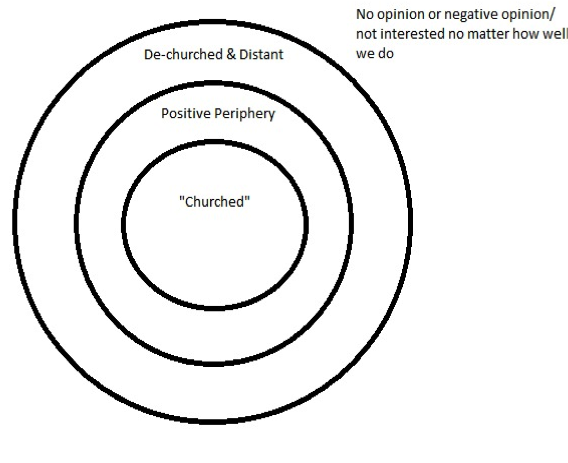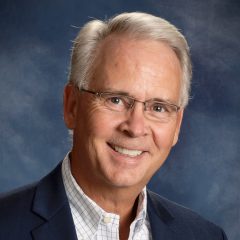A look at the biblical book of Acts helps answer the question, “Why plant a fresh expression of church?” For one thing, some have noted that today’s Western cultures look more like the world of the early church than has been true for almost two millennia.
And then there is Acts 1:8: “But you will receive power when the Holy Spirit comes on you; and you will be my witnesses in Jerusalem, and in all Judea and Samaria, and to the ends of the earth.” (NIV) Anglican church planters Bob and Mary Hopkins encourage people to consider those pivotal words of Jesus in a new way. What if, instead of unpacking the verse geographically (as usually happens) one were to think of varying distances from the center of the church?
From Spatial to Relational
Thinking of Acts 1:8 as varying distances from the center of the church might look like this:
“Jerusalem” here would represent the “churched”—people who are devoted followers of Jesus and serving faithfully in a local congregation. “Judea” would be the “positive periphery”—those who feel positive about the church but simply are not as active as they once were; their attendance is sporadic, and support is weak. “Samaria” is the “de-churched and distant”—people who left the church because they were bored, angry, disillusioned, disappointed, hurt or ashamed. Although few of the “de-churched and distant” ever return to church, some do. This may happen if there is a crisis in life, if a new church opens in the neighborhood, or if some other event prompts a person to think anew about church.
Might Acts 1:8 be denoting relational distances from church instead of geographical ones?
Tweet this.
Beyond the circles is “the ends of the earth,” representing the truly “unchurched.” These are people who are not at all likely to venture into church gatherings no matter how good the music, sermons, programs and facilities are. Church is simply not on their radar screens.
The Church’s Revolving Door
Most churches gain new members from those first three circles: those who are already “churched” and are simply moving from one congregation to another; those on the positive periphery who have decided to come back to church after a time away; and, occasionally, those who are “de-churched and distant.”
Rarely does someone become part of an existing church family from the “ends of the earth”—those who are truly unchurched. They have either written off church or never have considered church at all.
Fresh expressions of church help engage those in this latter category, the truly unchurched, who make up a growing percentage of the North American population.
Churches Need Churches
The book of Acts also provides a model of what Rowan Williams calls the “mixed economy” of churches.
Chapters 11 – 15 of Acts tell the story of two congregations. One is the established, “inherited,” resourced congregation attracting new Jewish believers in Jerusalem. The other is the creative, flexible congregation engaging Greeks in Antioch.
Not surprisingly, there were some tensions between the two. (New offshoots of established organizations often cause people some angst.) The people in Jerusalem and Antioch had different ideas about the importance of Jewish traditions, for example, and probably had different ideas about how involved the people in Jerusalem should be in Antioch’s business. However, there was a definite link between the two, and Antioch recognized the value of Jerusalem’s blessing and mentorship. There were advocates in Jerusalem for what was going on in Antioch. And the Antioch church connected with unreached people in ways that the Jerusalem church probably never could have.
Jerusalem and Antioch needed each other. The stability and depth of Jerusalem together with the rather cutting edge evangelistic ministry of Antioch provided effective outreach to a world hearing of Jesus for the first time. In those two congregations can be found a glimpse of a fresh expression of church—a new form of church coming alongside existing congregations for the sake of those who are not part of any church.



